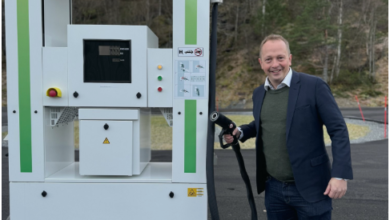First Hydrogen prepares LCVs for deployment

First Hydrogen Corp. is completing mileage accumulation and vehicle evaluation to optimise the efficiency of its zero-emission light commercial vehicles (LCVs) ahead of the vehicles’ deployment with fleet customers in March 2023.
Evaluations are being conducted with powertrain specialists AVL Powertrain, which put the vehicles through a range of real-world duty cycles, including urban, rural and highways routes. Based on the vehicle weight, battery size and powertrain energy consumption, First Hydrogen’s two LCVs have an expected range of 400-600km, depending on the route, on a single refuelling, which takes less than 5 minutes.
Data collected from the two hydrogen-fuel-cell-powered vehicles (FCEV) will allow First Hydrogen to accurately determine fuel consumption and vehicle range in different driving scenarios. It will enable the Company to utilize AI for predicting energy consumption, optimising fuel efficiency and identifying areas for further development. The data will capture the real-world capabilities of First Hydrogen’s future zero-emission vehicles, starting with its Generation II vehicle.
The data allows comparison to simulations made for the Worldwide Harmonised Light Vehicle Test Procedure (WLTP) testing that is part of EU law. A global standard, WLTP is used by buyers and commercial fleet managers to compare vehicles’ energy consumption, emissions, and, for electric vehicles, range calculations. Tests will take place until mid-March and data analysis will follow. Initial figures are expected by mid-March 2023 and will support First Hydrogen engineers to showcase the vehicles’ competitive Total Cost of Ownership (TCO), which is key information for commercial fleet managers investing in new vehicles. The data will also allow potential customers to draw true comparisons between FCEVs, battery electric vehicles and vehicles with internal combustion engines.
The tests will be completed before First Hydrogen deploys its two vans for trials with major fleet operators in the UK as part of a programme with the Aggregated Hydrogen Freight Consortium (AFHC). These operational trials offer companies, including national supermarkets, utilities, roadside assistance, and healthcare providers, the chance to experience zero-emission LCVs alongside their own fleets.
Stephen Pendrey, Chief Engineer for First Hydrogen Automotive, says: “These tests are an important part of our vehicle development and help us to ensure the vehicle is performing as efficiently as possible and in line with expectations. The data enables us to factor in vehicle weight and payload to calculate the amount of energy used for propulsion. The results provide verifiable data on expected range per kilogram of hydrogen used. This information shows commercial vehicle owners and fleet managers the output they can expect in specific conditions and illustrates the financial benefits of switching to a FCEV.”
